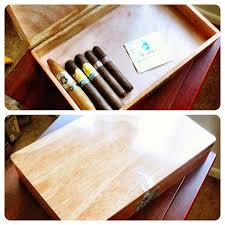Your Cart is Empty
Most smokers of premium, hand-rolled cigars will never experience an ammonia smell with the cigars in their collection or in a tobacconist’s humidor. But, believe it or not, ammonia gases are a standard byproduct of the fermentation process with tobacco.
As an aside, the first time I discovered the relationship between ammonia and tobacco leaves happened quite by accident. Many years ago, I was given an impromptu tour of a tobacco warehouse here in Ybor City. At one point, we came to a storage area and when my friend opened the sealed door to a refrigerated section, the smell of ammonia hit me like a ton of bricks and almost knocked me off my feet!

After tobacco leaves have been picked at the farm and cured in the curing barns, they are stacked in bundles called “hands” which in turn are stacked together into piles called “pilones”. The weight of the tobacco generates heat, up to 100 degrees Fahrenheit. This heat causes an exhausting of ammonia and other unpalatable organic compounds found in tobacco leaves which makes the cigars smell like ammonia.
So, if this fermentation process is meant to remove the ammonia compounds from cigar tobacco, why is it that the consumer sometimes comes across this smell? It all depends on the manufacturer and its standards. If a fermentation process is cut short or the tobacco is not aged long enough, the ammonia smell can still be present when cigars are shipped. Typically, this condition is found in Cuban cigars and is commonly known as a “sick period”. Under-fermented tobacco is said to be “green” (an industry term with no relation to the color of the leaf). I have also heard that a second fermentation could occur due to the wrapper leaf being wet prior to rolling but, I could not substantiate this as fact.
If you come across a box of cigars with an ammonia smell you most likely would not want to smoke them. Technically, there is nothing wrong with the cigars and there is a simple (if time-consuming) way to get rid of this ammonia aroma.

The easiest way is to separate these cigars from the rest of your collection and place them in a wooden humidor with no active or passive humidification. This is known as “dry boxing”. While a cedar lined, wooden humidor is preferred, you can also place the cigars into a plastic container. Just remember to open the lid occasionally to allow an exchange of air since plastic does not “breathe” and will trap these gases inside. I would only dry box cigars I intended to smoke within the next couple of days.
Most likely, and especially if you collect Cuban cigars, you would want to age these sticks for longer periods, perhaps years. The best way is to use a separate humidor where you can monitor temperature and humidity just like the rest of your cigars. With enough time and care, the ammonia smell will dissipate and you will be able to enjoy some well-aged, excellent cigars.
While enjoying a premium, hand rolled cigar, how often do you actually think about the process of creating cigars or the tobacco plant itself? Probably not often. Also, how many cigar smokers have actually had an opportunity to visit a tobacco farm to see the rows upon rows of tobacco plants? A small percentage of […]
Welcome to the first ever CH infographic! This first one is a quick reference guide to cigar wrappers. Let us know what you think. Embed code (please be sure to convert quotation marks from curly quotes to straight quotes): <a href=” http://www.cheaphumidors.com/blog/infographics/infographic-cigar-wrapper-classifications/”><img src=” http://www.cheaphumidors.com/blog/wp-content/uploads/2012/05/Wrapper-Classification2.jpg ” alt=” Cigar Wrapper Classifications – Infographic ” title=” Cigar Wrapper […]

CheapHumidors would like to welcome you to a brand new section of our blog. Shaken, Not Stirred will cover all topics beer, wine and liquor related. CH would like to thank guest author Stan Schubridge at Beertaps.com for kicking things off! Jägermeister actually started out as anything but the drink we know today. The term was introduced in […]